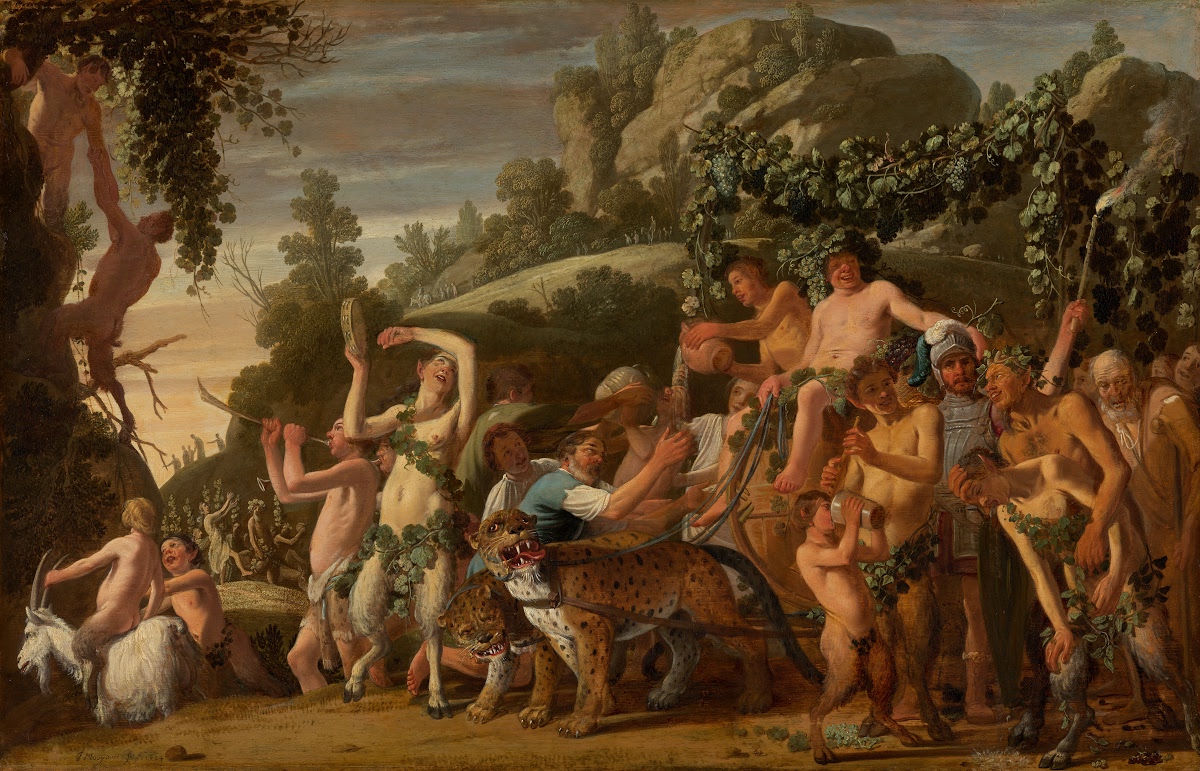Triumph of Bacchus (Nicolaes Moeyaert, 1624)
For sensible men, I prepare only three kraters: one for health (which they drink first), the second for love and pleasure, and the third for sleep. After the third one is drained, wise men go home. The fourth krater is not mine anymore – it belongs to bad behaviour; the fifth is for shouting; the sixth is for rudeness and insults; the seventh is for fights; the eighth is for breaking the furniture; the ninth is for depression; the tenth is for madness and unconsciousness. (attributed to Dionysus, in a surviving fragment of the lost play by Euboulos)
And so, my instinct at that time turned itself against morality in this questionable book, as an instinct affirming life, and invented for itself a fundamentally different doctrine and a totally opposite way of evaluating life, something purely artistic and anti-Christian. What should it be called? As a philologist and man of words, I baptised it, taking some liberties – for who knew the correct name of the Antichrist? – after the name of a Greek god: I called it the Dionysian. (Nietzsche, ‘An Attempt at Self-Criticism’)
Philosophy and Wine: The Symposium
Wine has not been the subject of serious philosophical appreciation in the modern context until very recently, even though it has had an intimate association with philosophy since its institutionalisation in classical Greece under Socrates and Plato. The exact translation of the Greek word symposion is ‘to drink together.’ In classical Greece, the symposion was an occasion when a group of men and male youths eat and drink together, according to strict nutritional, religious and cultural rules, while they entertain, talk and discuss philosophical issues. Eating and drinking in his context had become part of civilised society and culture. Indeed, wine, along with bread and olives (especially olive oil), was not only the basic and necessary aspects of the traditional Greek diet but was considered part of the divine – a gift from the gods – and accordingly took on a sacred place in Greek life elevated as part of religious and cerebral cultural life. Wine, bread and olive oil, still the main ingredients of the Mediterranean diet, were to be distinguished from the foods provided through hunting, fishing or gathering as they were the result of agriculture and technology. Drinking wine and eating food as social acts taking place with family or friends and in ceremonies such as feasts and religious rituals became the cornerstone of the Greek food and dietary system and the basis of civilisation that was part of learning, socialisation, religious life and also significantly, philosophy.
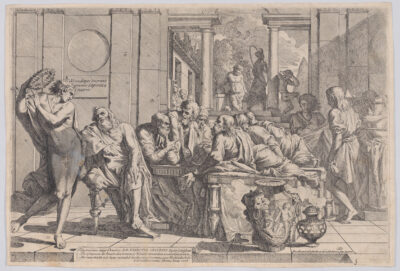
Plato’s Symposium: Socrates and his Companions Seated Around a Table Discussing Ideal Love interrupted by Acibiades at left (Pietro Testa, 1648)
The symposion was one of four main forms of ritualised consumption where men ate and drank together as equals and therefore reinforced a set of community values. There was, in addition, the religious festival, the military common meal, the public meal granted as an honour by the polis, and the symposion for pleasure. The Greeks also established a distinction between eating and drinking, according to the latter, the consumption of wine, a privileged place above eating. As Oswyn Murray notes in Sympotica: A Symposium on the Symposion,
The rituals concerned with food relate to distribution (especially of sacrificial meat) rather than consumption…. It is rather the consumption of wine at the symposion after the deipnon [‘dinner’ or ‘feast’], that became the focus of elaborate ritualisation, concerning the obligatory mixing of wine with water, the objects for use at the symposion, the serving of the drink, the order and character of singing or speaking, and the entertainments evolved. For the purpose of tracing Greek influence on other cultures, one of the most important of these elements is the mixing of the wine with water, normally diluting it by at least a half: it is characteristic of barbarians that they drink their wine neat, thus infringing the prerogatives of the gods. The mental world of the Greeks of the Archaic age is revealed to us most clearly in the decoration of the objects made for the ritual of the symposion, Greek painted pottery, and in the poetry composed for performance there.
Murray goes on to explain that the ‘sympotic space’ consisted in a dining-room (andron) with specific dimensions, capable of seating in reclining fashion on couches (with two to a couch) between 14-30 members of the group, which formed strong and intimate group loyalties and operated according to its own rules that were very different from those of the polis. There was a strict code of honour and a willingness to establish alternative behaviours that carried with them their own sense of occasion, creating a type of ‘free love’ with the hetaira and the homosexual bonding of young males according to a strict ethical code. Young men were introduced to the group and inducted into the rites and rituals of the symposion as a companion and erosmenos of an adult male with whom he was involved in a pederastic relationship. The Greek pederastic relationship was considered an aristocratic moral and pedagogical institution with its supposed origin in Indo-European rites of passage or a means of birth control inherited and formalised in Crete. In the discipline of philosophy today, little is made of the actual historical experience of the symposium, its clubbishness, its all-male grouping, its pederastic relationship and its wine-drinking bouts. The fact that philosophy has its origins in symposia, in wine-drinking and pederastic relationships has drawn little comment from philosophers themselves except perhaps for the French philosopher-historian Michel Foucault, who, in his L’Histoire de Sexualité written toward the end of his life, examines an analytics of power and a science of sexuality in the West by focusing on ancient erotics indicates how ‘homosexuality’ is a social construct barely a hundred years old.
‘Symposium,’ as the Greek term for a drinking party and now used to refer to an academic conference, was a distinctive ceremonial banquet occasion where wine and food were shared among men, young and old, who enjoyed conversation, drinking games, rhetorical contests, music and dancing, and other forms of entertainment. Philosophical subjects were also discussed at these symposia, which were very frequent in Athens. We have two contemporary accounts of symposia given by Plato and Xenophon.
Plato’s Symposium, written sometime after 385BC, is a wine-drinking party where a discussion on the nature of love takes place in terms of a number of speeches that together constitute one of the most influential treatments of love in Western literature. The speeches are given by a group of seven men (Phaedrus, Pausanias, Eryximachus, Aristophanes, Agathon, Socrates and Alcibiades) at the house of Agathon in Athens and comprise a very complex structure consisting in an introduction, three agons–Phaedrus vs. Pausanias, Erixymachus vs. Aristophanes, and Agathon vs. Socrates – separated by comic interludes and followed by an epilogue. The introduction has Apollodorus conversing with a friend in an Athenian street, who, in the course of the conversation, recounts a discussion with Glaucon about a symposion that took place at the home of Agathon and shares some news of it from Aristodemus. In this context, Apollodorus provides some (second-hand) details about the nature of drinking at the feast:
Socrates took his place on the couch and supped with the rest, and then libations were offered, and after a hymn had been sung to the god, and there had been the usual ceremonies, they were about to commence drinking when Pausanias said, ‘And now, my friends, how can we drink with least injury to ourselves? I can assure you that I feel severely the effect of yesterday’s potations and must have time to recover, and I suspect that most of you are in the same predicament, for you were of the party yesterday. Consider then: How can the drinking be made easiest?’
Eryximachus, the physician, in the course of the opening discussion, mentions ‘weak heads’ and those ‘who cannot drink’ only to advise that ‘drinking deep is a bad practice.’ It is agreed by all participants that ‘drinking is to be voluntary, and that there is to be no compulsion,’ probably a prerequisite for philosophical reflection, and Eryximachus proposes that, instead of listening to the flute-girl, they make speeches in honour of love. This is not the place to embark on a full exposition of the dialogue on love except to say that it emerges that love for Socrates is a mystical contemplation of the good and the beautiful. In its highest form, it is love of a pure abstraction. Plato’s Symposium sheds light on the way in which wine drinking is part and parcel of the institutional beginning of philosophy, tied up as it is with eros: wine, philosophy and love. Yet Murray remarks: ‘Despite the enormous importance of Plato’s Symposium within the classical tradition, the tradition itself betrays limited understanding of Greek sympotic customs.’
Xenophon’s Symposium, by contrast, consists in a witty contest between Socrates and Callias at a feast given by Callias for his eromenus (‘beloved,’ i.e., an adolescent boy aged 12-17) Autolycus and his father. In this dialogue, Socrates ends up by praising Callias for his love of Autolycus. Xenophon tells a great deal about the nature of symposia: the bathing, the libations, the feasting, the supping, the entertainment of the flute-girl and the jester, the hymn singing, the unguents, and the dancing. In Act II, Socrates, in the name of moderation, remarks:
Wine it is in very truth that moistens the soul of man, that lulls at once all cares to sleep, even as mandragora drugs our human senses, and at the same time kindles light-hearted thoughts, as oil a flame. Yet it fares with the banquets of men, if I mistake not, precisely as with plants that spring and shoot on earth. When God gives these vegetable growths too full a draught of rain, they cannot lift their heads nor feel the light air breathe through them; but if they drink in only the glad supply they need, they stand erect, they shoot apace, and reach maturity of fruitage. So, we, too, if we drench our throats with over-copious draughts, ere long may find our legs begin to reel, and our thoughts begin to falter; we shall scarce be able to draw breath, much less to speak a word in season. But if (to borrow language from the mint of Gorgias), if only the attendants will bedew us with a frequent mizzle of small glasses, we shall not be violently driven on by wine to drunkenness, but with sweet seduction reach the goal of sportive levity.
Wine in the Greek context is inseparable from the symposium, and the dramatic form becomes the classical dialogue that animates so much Greek philosophy, especially as written by Plato.
Euripides’ The Bacchae reveals more of Dionysus and Dionysian ritual. The play, which won first prize in the City Dionysian festival competition, concerns King Pentheus of Thebes and his mother and their punishment by Dionysus for refusing to worship him. As Ian Johnston (2001) records in an introductory note on the play, ‘The central conflict in the play focuses on the clash between this new religion and the traditional Greek way of life.’ He goes on to suggest that the central action of the play involves the invasion of Greece by an Asian religion, originating in Thebes and sweeping through Asia Minor.
It’s also clear enough what this religion involves, a rapturous group experience featuring dancing, costumes, music, wine, and ecstatic release out in nature away from the city (in the wild, potentially dangerous nature of the mountains, not in the safer cultivated areas). It is presented to us as a primarily (but not exclusively) female experience, one which takes women of all ages away from their homes and their responsibilities in the polis and confers on them amazingly irrational powers, beyond the traditional controls exercised by the male rulers of the city, and brings them into harmony with wild nature (most obviously symbolised by the dancing in bare feet). In the Bacchic celebrations, the traditional lines of division between human beings and animals and between different groups of human beings (social and gender differences) break down and disappear or are transformed. The play stresses the beauty, energy, creativity, and communal joy of this Bacchic ritual, while at the same time repeatedly informing us of the destructive potential latent in it.
Standard interpretations, as Johnston indicates, see The Bacchae as (i) a punishment for impiety, (ii) an indictment of Dionysian religion, and (iii) a choice of nightmares (‘a despairing vision of the destructiveness inherent in the ambiguities of human existence’). Johnston continues:
The play forces us to examine the destruction of this earlier harmony between gods and men and hence of the political and communal ideal that it endorses. Dionysus, an eastern god (or a god bringing with him a different relationship to the divine), is interested in submission, ecstatic revelry, and drink. Those who do not at once celebrate this vision of divinity are subjected to harsh, instant, irrational punishment for disobedience. And the penalty he inflicts here–the killing of a child by his mother and the banishment of the royal family into barbarian lands (a significant contrast to the Oresteia, where the killing of a mother by the son helps to establish human justice under divine auspices in the polis) – marks an end to whatever Greek Thebes was all about to begin with. The barbarian East, where Cadmus originally came from, has triumphed.
In this respect, we can understand the deep mythological and historical reasons why Nietzsche chose Dionysus as a model or principle for defining Greek culture and for understanding Greek tragedy as that high art form that transcends meaninglessness and nihilism of life. The Dionysian element or principle is mostly evident in the music of the chorus comprised of goat-men and satyrs that defined Dionysian revelry and drunkenness, giving birth to tragedy. It is only with Socrates and Plato that we get the attempt to redefine the basis of the good life based on rational principles that, for Nietzsche, undervalues the value of myth, minimises the ecstatic and underscores the significance of suffering in human life.
Wine Gods, Morality and History
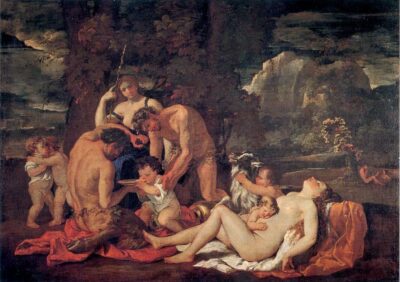
The Nurture of Bacchus (Nicolas Poussin, 1630-35)
The early prehistory of wine is thought to date back to the Neolithic period and the collection and eventual domestication of the wild grape, Vitis vinifera, common around the coasts of Asia Minor. It is also often assumed that winemaking came to Greece through Cretan trade with the Phoenicians. Archaeological evidence points to the fact that winemaking was common to Greece by the end of the Minoan civilisation around 1500BC and certainly well established by the time of the establishment of the Greek city-states in 750-550BC. In the preceding two hundred years, 900-700BCE, the period when the Homeric poems are thought to be recorded, the first references are made to Dionysus, with an early reference to a deity named ‘Diwonysos’ appearing as part of a Linear B inscription found at a Mycenaean site near Pylos. As the Greek winemakers’ website records:
Whether this deity was associated with wine cannot be proven, but there is little doubt that wine, which already had become an integral element of Greek culture, had developed a religious status by the end of this period.
Menahem Luz, writing a text for a Dionysus exhibition at Museum Hecht, Haifa University comments:
The myths and fables surrounding Dionysus, God of Wine, are the most savage and emotional in the whole of Greek mythology. They describe drunkenness, madness and wild ritual. They tell of cannibalism, voyeurism, transvestitism, infanticide, omophagia and the murder of a son by his mother. All of this by command of the Lord of Wine. Obviously, this mythological tradition also proves to be one of the richest in Greek literature.
And he goes on to write:
In classical Greek society, the festivities of Dionysus – the Dionysia or Bacchaea – signified a break from the routine of everyday life: a rest for the wife from her weaving and for the husband from social conformity. Nonetheless, as early as the 8th century BCE, the God of Wine was thought to be an ambivalent source of good and evil. In Homer, he was considered to have been ‘the pleasure of mortals’ (Iliad, xiv. 325), but in Hesiod, his is a ‘bittersweet gift to men’ (Shield of Hercules 400). Thus, from the very beginning of Greek poetry, Dionysus was considered both a good as well as an evil for those who abstain from his gifts.
The complicated genealogy of wine and its hidden or subterranean network of religio-moral concepts is connected to Ancient Greece and the wine gods Dionysus and Bacchus. The archaeology of wine stretches back a lot further. Briefly, Dionysus is the Thracian god of wine, and Bacchus is the Lydian name for Dionysus. While there is some dispute about the origin of the name Dionysus, some commentators, suggesting that the cult arrived from Anatolia (present-day Turkey) or Libya, Ethiopia, or Arabia, Dionysus’ name is found on ancient syllabary tablets in Mycenean Linear B script, which predated the Greek alphabet by several hundreds of years. Károly Kerényi, the Hungarian historian of myth and collaborator of Jung, traces Dionysus to Minoan Crete, a Bronze Age culture circa 2700 to 1450 BCE that became dominant on Crete.
Dionysus was the product of a union between Zeus and Semele – the king of the gods and a mortal woman – and in another version, Zeus and Persephone, Queen of the underworld. His childhood and early life are also the subject of speculation, and there are different versions of myths surrounding him. Dionysus, as an adult, discovered wine and taught the culture of the vine in Asia and famously in India. Dionysus is the god of wine and more widely known as the patron deity of agriculture and theatre. He is viewed as a promoter of civilisation and a lawgiver. The ancient Greek Διόνυσος or Διώνυσος is associated with the Roman Liber, itself the basis of the Roman festival Liberalia, traditionally held on March 17 to honour Liber Pater, an ancient god of fertility and wine. Bacchus was also known as the Liberator (Eleutherios, an epithet of Dionysus and Eros) for freeing oneself from one’s normal state of selfhood through the intoxication of wine.
According to Musagora, Dionysus is the god of festivities and wine:
But, once again, he is ‘multiple’: he is Bacchus and Lusios, source of mania and liberator, and he almost always preserves a wild personality…depictions of the festivals are innumerable, the frenzied maenads who dance for the god to the music of the flute and the tambourine. He is the god of Ecstasy, while, in his other persona, he is simultaneously the ‘sweet and effeminate god of wine’… But Dionysus remains the god of the mask; and theatre originates from festivals celebrated in his honour. Comedy and tragedy are directly associated to religious festivals honouring the god, and to the sacrifice celebrated on such occasions. Great Dionysia was also the occasion for the Athenians to assert the excellence of their city.
Philosophy of Wine Today
In April 2007, the Pacific Division of the American Philosophy Association (APA) held a mini-conference on Philosophy and Wine in Francisco at their annual meeting with papers addressing questions of wine perception and variation in interpretation, the judgment of taste and the possibility of objective standards, analysis of taste, wine categories, wine evaluation, its beauty, aesthetics and communication, together with a closing panel of viticultural experts and tutored tasting. In essence, the mini-conference focused on wine appreciation and particularly wine tasting in the same way that art appreciation focuses on the critical experience in appreciation of art by attention to examples of artworks.
This mini-conference has been supplemented by the publication of two books. The first is a collection of essays edited by Barry Smith (2007) called A Question of Taste: The Philosophy of Wine. As Nigel Warburton summarises in a very positive review of the book
Questions of Taste consists of essays by a range of philosophers, including Roger Scruton, Barry Smith and Tim Crane, together with pieces by wine professionals such as Paul Draper (chief winemaker at Ridge Wines, California, himself a philosophy graduate), Steve Charters, a Master of Wine who has written on the topic of wine and society, the wine writer Andrew Jefford, and the wine scientist Jamie Goode.
The lead essay by Smith that referenced Hume’s ‘Of the Standard of Taste’ examines the idea of taste distinguishing between taste as sensibility (considered as a property of the wine) and tasting that refers to the subjective experience of taste. Smith argues for an objectivist account where elements of the wine, such as its acidity, can be established through objective means.
The second book, entitled Wine & Philosophy: A Symposium on Thinking and Drinking, edited by Fritz Allhoff, explores a range of philosophical topics related to food, including ‘The Art & Culture of Wine,’ ‘Tasting & Talking about Wine,’ ‘Wine & Its Critics,’ ‘The Beauty of Wine,’ ‘The Metaphysics of Wine,’ and ‘The Politics & Economics of Wine.’ The collection incorporates traditional areas of philosophical study and is written in an accessible way for general audiences, although we might also say it is written in the analytical mould. This is not to say that the essays on ‘Wine in Ancient Greece’ (Harold Tarrant) and the politics and economics of wine do not touch my interests, but only to say that the approach is through the traditional philosophical lens of questions of aesthetics, of taste, of beauty and so on, leading to questions about evaluation and assessment and the notion of standards – questions which. This approach is both valuable and significant and clearly critical for the wine industry.
I should also take the opportunity to mention in this context the Journal of Philosophy of Wine called Tacuinum, no longer published, which the editor Giacomo Mollo described as follows:
‘Tacuinum’ is a Middle-Age Latin term meaning ‘notebook,’ ‘small book of thoughts.’ It has been inspired by the ‘Tacuinum Sanitatis,’ a manuscript that was circulating in Europe during the 13th and 14th centuries. This was based on a pre-existing Arab treatise on health which was subsequently implemented by the Christianity-inspired Latin tradition. It described the six fundamental habits for well-being and preservation of health. ‘Vitineum’ is the neutral form of the Latin adjective ‘vitineus, -a, -um.’ This is the simplified version of ‘vitigineus’ (together with ‘vitigenus’) which is composed by ‘vitis,’ vine and the verb ‘generare,’ to generate. The literal translation would be ‘originated from the vine.’ The conjunction of terms can be translated like ‘a book of thoughts generated by the vine.’ The journal, to summarise, is the result of thoughts created from the contact of the mind with the essence of the vine and materialised in the written form.
Tacuinum: Journal of Philosophy of Wine was an electronic publication, the first issue of which had the same or similar essays by Smith, Scruton and Bach, with contributions also from Ophelia Deroy and Noga Arikha. Mollo provides his journal with a set of opening reflections, including the following final paragraph:
I strongly believe that philosophy has incredible intuitions and conceptual frameworks able to provide crucial insights about the nature of wine and the experience of wine tasting. Unfortunately, these aspects never received the attention they deserved within the wine sector. The journal aims, therefore, at emphasising these intuitions: wine has embedded in it a profound nature that is revealed by the philosophical discourse. Publishing a journal on philosophy of wine will be one of the first steps toward stimulating an academic debate about the issue together with promoting an alternative view on wine. A view that regards the experience of wine as a genuine intellectual experience: it is refinement of the senses and refinement of the mind. It requires to be imaginative, to be critical and also to share thoughts for mutual growth. After all, this is also what philosophy is about.
These contributions were extremely welcome and excellent beginnings to a virgin field. What is remarkable is that the philosophy of wine should have taken so long to mature. It is as if the bottle of philosophy has been in the racks for 9,000 years and never opened. (Only some wines improve with age.) There is an interesting question here that the historiography of wine philosophy will eventually revise as the evidence becomes available.
There are at least two broad approaches to the philosophy of wine. I, therefore, prefer ‘philosophies of wine’ as opposed to the philosophy of wine. I make this distinction tentatively and invite others to explore the soundness of it. The first is what I call the humanities approach, that is, philosophies of wine that raise philosophical questions through the traditional humanities disciplines – archaeology, mythology, religion, history, geography, political economy and so on. This approach should not be seen as simply devoted to raising second-order questions about wine from the perspective of the discipline. I have indicated my reasons for making this assertion above. The second approach is, broadly speaking, that notion of philosophy that attaches itself to technique (technē) and to processes in general: winemaking, wine production, wine tasting and both wine appreciation and wine education which are wider categories. This approach may be seen to subsume the analytic approach to the question of taste, although it does arise properly out of traditional questions and branches of philosophy. The distinction is not meant to be absolute but merely a heuristic device and tool for investigation.
I have attempted to elaborate an approach from the first of these categories that focuses less on the question of taste and traditional aesthetics and rather more on what we might call the genealogy of wine discourse through an investigation of Greek mythology and the pre-history of wine that has created for us a religio-moral space (as well as an aesthetic one) that constitutes the discourse of wine, intoxication and sex, among other things which to me constitutes an important part of wine education.
Appendix: The Cult of Dionysus in Athens
Four festivals are dedicated to Dionysus, from the beginning of Winter to the beginning of Spring:
The Lesser (Rural) Dionysia, during the month of Poseidon (corresponding to our December):
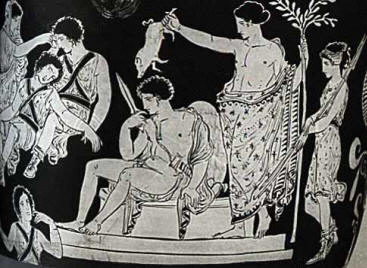
This festival spreads throughout the month of Poseidon. Each deme would organise its thiasos. A symbol of the phallos, sign of fertility, was carried through the dancing and singing procession, which ended with a sacrifice consisting of baked bread or a gruel of cereal (Aristophane, The Acharnians).
The Lenaia, during the month of Gamelion (January-February):
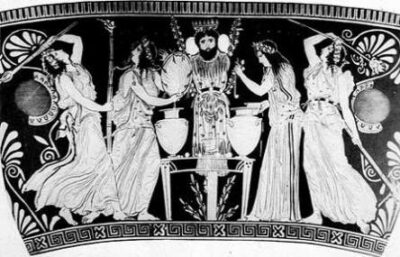
The most ancient of the festivals dedicated to Dionysus: the procession would advance towards the sanctuary of Dionysus called Lenaion, probably at the foot of the western slope of the Acropolis. It seems that this festival consisted of orgies (to do Lenaia; to do bacchanalia) led by the daduchus (the torch carrier, dais, daidos), who invites the participants to invoke lacchos, son of Semele, provider of the earth’s fertility. This invocation is maintained in the inauguration of the theatrical competitions.
The Anthesteria, during the month of Anthesterion (February-March):
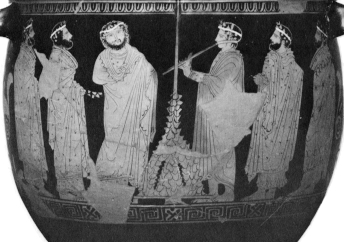
This festival takes place before the full moon of March and is connected with the growth of vegetation (anthos, ‘flower’). It is thought that this three-day festival lifted the ban on the consumption of produce saved during the winter. On the first day, jars (pithoi) containing the new wine were opened. On the second day, there was a drinking competition (the wine was poured into earthenware pitchers, khoes): ‘This competition was open to men and young boys from the age of three. For the occasion, they received a jug adapted to their capacity’ (Louvre.edu, Sophie Padel). The champion was crowned with ivy and received a filled wineskin. The festival honours beneficial humidity: the image of the god was carried on a float shaped like a boat. Afterwards, at the sanctuary called the Boukoleion, a hierogamy would take place – the King Archon and his wife would unite, symbolising the union of Dionysus and Basilinna, ancient queen of Athens. On the third day, the festival of the pot (khytroi) was the festival of the dead: a gruel was prepared from several cereals, the panspermy, which was to be eaten with one’s family before nightfall. Sacrifices were made to Hermes psychopompos (conductor of souls into the underworld), and bad spirits were willed away: ‘Go, you Keres, the Anthesteria is ended.’
The Great (City) Dionysia, during the month of Elaphebolion (March-April):
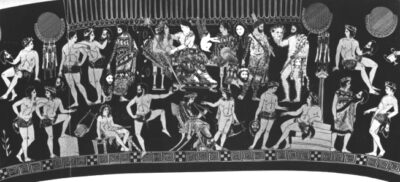
The first day of this festival was consecrated to choruses called dithyrambs (dithurambos, probably the double thriambos, which gave the Latin name triumphus), eulogies in honour of the gods: fifty men danced and sang around Dionysus’ altar (altar called thymele) to the sound of flutes and tambourines, on the Agora not far from the altar of the twelve gods. Originally these dithyrambs would take place at night in the glow of torches and lead to phenomenon of ecstasy or hysteria. The second day, athletic or poetic (rhapsodist competitions) and jousting matches (agones) were held. The three following days were dedicated to theatre: tragedies, dating from 534 (etymologically, tragedies are songs in honour of the goat, tragos, an animal associated with Dionysus), each trilogy of tragedies was followed by a satiric play (the chorus made up of satyrs, half men/half goats). Comedies, which some say originate from the cortèges of inebriated peasants (songs of komoi, of the villages), do not become dialogued texts until 486. From the point of view of the cult of Dionysus, the Great Dionysia festival ends with a triumphal procession and the crowning of the god.
This text originally appeared as Peters, M. A. (2009). Dreams of Dionysus: Wine, philosophy and eros. Linguistic & Philosophical Investigations, 8, 36-52.



